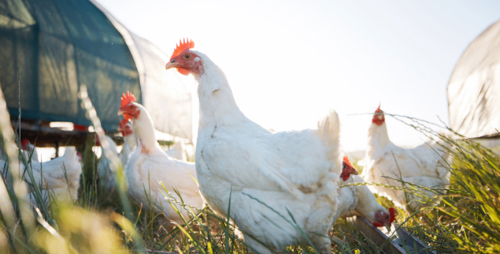Engaging on animal welfare with Whitbread
Ffion Spencer, Castlefield's Stewardship Assistant, outlines our recent engagement with Whitbread on its performance in the 2023 Business Benchmark on Farm Animal Welfare.
Despite our limited exposure to the food industry, animal welfare remains a priority for us and our clients. We recently engaged with Whitbread, a company in our UK Opportunities fund known for brands like Premier Inn and Beefeater, on its performance in the 2023 Business Benchmark on Farm Animal Welfare (BBFAW).1

As signatories to the Business Benchmark on Farm Animal Welfare (BBFAW), we regard ethical animal practices as both the right course of action and a crucial tool in reducing regulatory and reputational risks, thereby supporting long-term value creation for our clients.
We noted that Whitbread’s performance in the 2023 BBFAW benchmark was poorer than in previous years and reached out to discuss the reasons behind this and the recommendations made for them.
A key recommendation for Whitbread was to align with the Better Chicken Commitment (BCC) for broiler chickens. During the call, we learnt that Whitbread has made progress by monitoring its chicken supply against BCC criteria, with 30% of its poultry now sourced from farms that meet these standards. However, the company highlighted the challenges it faces in sourcing to these criteria, which hinder the implementation of targets to increase this percentage.
The retail sector currently dominates demand for these higher welfare birds, and supply is further constrained by issues such as avian influenza. This is a clear example of a company striving to do more but facing external limitations.
we learnt that Whitbread has made progress by monitoring its chicken supply against BCC criteria, with 30% of its poultry now sourced from farms that meet these standards
We were encouraged by Whitbread’s appointment of a dedicated Procurement Manager for Agriculture, who oversees animal welfare in he company’s supply chain. This hire brings significant expertise and has already made notable improvements, including more robust auditing practices with independent third-party verification and changes to the poultry supply chain.
During our engagement, we were pleased to learn that Whitbread has moved up a tier in the 2024 BBFAW benchmark. Additionally, the Procurement Manager is involved with the Free Farrowing Initiative, which researches and promotes best practices for sows; this is linked to another recommendation made by the benchmark’s authors.
Whitbread noted this as an area of uncertainty and emphasised the need for greater information on best practice for housing sows. The company has set a target for 20% of its pork to come from farrowing-free conditions by the end of 2025, demonstrating its commitment to improving welfare in this area despite the need for more clear best-practice guidance.
We are encouraged by Whitbread’s progress since the 2023 benchmark
In our view, Whitbread’s reporting does not fully reflect its progress and we have encouraged the team to publish more detailed information in this area. We also suggested that the company align its animal welfare policies for its operations in Germany with those in the UK, a possibility Whitbread has acknowledged.
We are encouraged by Whitbread’s progress since the 2023 benchmark. Improvements in procurement, supplier auditing, and animal welfare policies have already yielded tangible results, including the company’s improved standing in the 2024 BBFAW benchmark. This progress demonstrates Whitbread’s commitment to enhancing its animal welfare practices and underscores the importance of ongoing dialogue on these critical issues.
Written by Ffion Spencer
Sources
1. BBFAW | Benchmark https://www.bbfaw.com/benchmark/